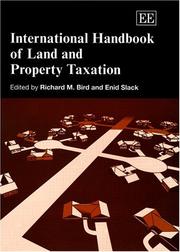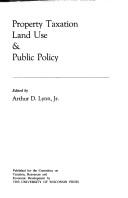| Listing 1 - 10 of 28 | << page >> |
Sort by
|
Book
Year: 2021 Publisher: Washington, D.C. : The World Bank,
Abstract | Keywords | Export | Availability | Bookmark
 Loading...
Loading...Choose an application
- Reference Manager
- EndNote
- RefWorks (Direct export to RefWorks)
Tax revenue in many low-income countries is inadequate for funding government investment in infrastructure and public services. This paper examines two dimensions of low state capacity that hinder tax collection: the inability to ascertain the tax base (detection capacity) and the inability to enforce unpaid liabilities (enforcement capacity). A randomized experiment with Liberian property owners finds that using identifying information from a newly developed property database to alert property owners that their noncompliance has been detected quadruples the tax payment rate, but only when the notice includes details on the penalties for noncompliance. A second experiment finds a further increase in compliance from signaling greater enforcement probability to delinquent property owners. These results highlight the importance of investments in both detection and enforcement capacity.
Fiscal Capacity --- Law and Development --- Public Sector Development --- Real Estate Tax --- State Capacity --- Tax Compliance --- Tax Enforcement --- Tax Law --- Taxation --- Technology

ISBN: 0801887631 1421401681 9780801887635 Year: 2008 Publisher: Baltimore : Johns Hopkins University Press,
Abstract | Keywords | Export | Availability | Bookmark
 Loading...
Loading...Choose an application
- Reference Manager
- EndNote
- RefWorks (Direct export to RefWorks)
"Inheritance in Contemporary America tackles the complex legal, policy, and emotional issues that surround bequests and inheritances in an era of increasing longevity, broadening ethnicity, and unraveling social safety nets. Through empirical analyses, case studies, interviews, and anecdotes, Jacqueline L. Angel explains the historical nature of familial giving and how it is changing as the nation's demographics shift. She explores the legal, personal, and policy complexities involved in passing wealth down through generations and provides a cross-disciplinary context for exploring the indelible effects that newly unfolding inheritance practices will have on various societal cohorts and the nation in general." "From nuclear and extended families to the state and nongovernmental bodies, Angel's study explores how attitudes toward giving are evolving and confronts in stark terms the legacy that these shifts in attitude will leave. This book will be a vital tool for scholars and practitioners in gerontology, sociology, psychology, anthropology, economics, political science, and public policy."--BOOK JACKET.
Inheritance and succession --- Wealth --- Inheritance and transfer tax --- Estate planning --- Older people --- Family relationships --- Care --- Health and hygiene --- Death-duties --- Estate tax --- Estates (Law) --- Inheritance tax --- Legacies, Taxation of --- Succession taxes --- Taxable transfers --- Taxation of legacies --- Transfer tax --- Taxation
Book
ISBN: 9264634282 9264470670 9264683291 Year: 2021 Publisher: Paris : OECD Publishing,
Abstract | Keywords | Export | Availability | Bookmark
 Loading...
Loading...Choose an application
- Reference Manager
- EndNote
- RefWorks (Direct export to RefWorks)
The report explores the role that inheritance taxation could play in raising revenues, addressing inequalities and improving efficiency in OECD countries. It provides background on the distribution and evolution of household wealth and inheritances, assesses the case for and against inheritance taxation drawing on existing theoretical and empirical literature, and examines the design of inheritance, estate and gift taxes in OECD countries.
Wealth tax. --- OECD countries. --- Inheritance and transfer tax. --- Death-duties --- Estate tax --- Estates (Law) --- Inheritance tax --- Legacies, Taxation of --- Succession taxes --- Taxable transfers --- Taxation of legacies --- Transfer tax --- Taxation --- Net worth tax --- Taxation of wealth --- Business & Economics
Book
ISBN: 0299054608 Year: 1969 Publisher: London University of Wisconsin Press
Abstract | Keywords | Export | Availability | Bookmark
 Loading...
Loading...Choose an application
- Reference Manager
- EndNote
- RefWorks (Direct export to RefWorks)
Economic development --- -Real property and taxation --- -Real property tax --- -Council tax --- Land tax --- Land use --- Real estate tax --- Real property --- Taxation of real property --- Property tax --- Homestead exemptions --- Taxation and real property --- Taxation --- Development, Economic --- Economic growth --- Growth, Economic --- Economic policy --- Economics --- Statics and dynamics (Social sciences) --- Development economics --- Resource curse --- Congresses --- Real property and taxation --- Real property tax --- Congresses. --- -Congresses --- Council tax
Book
ISBN: 9020005626 Year: 1979 Publisher: Deventer
Abstract | Keywords | Export | Availability | Bookmark
 Loading...
Loading...Choose an application
- Reference Manager
- EndNote
- RefWorks (Direct export to RefWorks)
Family law. Inheritance law --- Tax law --- Inheritance and transfer tax --- -Family corporations --- -Close corporations --- Corporation law --- Family-owned business enterprises --- Death-duties --- Estate tax --- Estates (Law) --- Inheritance tax --- Legacies, Taxation of --- Succession taxes --- Taxable transfers --- Taxation of legacies --- Transfer tax --- Taxation --- Congresses --- taxation --- -Congresses --- -Death-duties --- Family corporations --- Taxation&delete& --- Congresses. --- Close corporations
Book
ISBN: 9780414045958 Year: 2011 Publisher: London Sweet and Maxwell
Abstract | Keywords | Export | Availability | Bookmark
 Loading...
Loading...Choose an application
- Reference Manager
- EndNote
- RefWorks (Direct export to RefWorks)
Wills --- Decedents' estates --- Probate law and practice --- Inheritance and transfer tax --- Executors and administrators --- Taxation --- Law and legislation --- Estates of decedents --- Estates (Law) --- Inheritance and succession --- Law, Probate --- Civil procedure --- Death-duties --- Estate tax --- Inheritance tax --- Legacies, Taxation of --- Succession taxes --- Taxable transfers --- Taxation of legacies --- Transfer tax --- Administrators and executors --- Letters of last instructions --- Trusts and trustees

ISBN: 1843766477 Year: 2004 Publisher: Cheltenham : E. Elgar,
Abstract | Keywords | Export | Availability | Bookmark
 Loading...
Loading...Choose an application
- Reference Manager
- EndNote
- RefWorks (Direct export to RefWorks)
Land value taxation. --- Real property tax. --- Local finance. --- Land value taxation --- Effect of taxation on --- Real property tax --- #SBIB:043.IOS --- #SBIB:35H220 --- #SBIB:35H435 --- Council tax --- Land tax --- Land use --- Real estate tax --- Real property --- Taxation of real property --- Property tax --- Homestead exemptions --- Taxation of land values --- Single tax --- Financieel management bij de overheid: algemene werken --- Beleidssectoren: economisch en werkgelegenheidsbeleid --- Taxation

ISBN: 0299069206 9780299069209 Year: 1976 Volume: 8 Publisher: Madison (Wis.): University of Wisconsin press,
Abstract | Keywords | Export | Availability | Bookmark
 Loading...
Loading...Choose an application
- Reference Manager
- EndNote
- RefWorks (Direct export to RefWorks)
Land use --- -Land --- Land utilization --- Use of land --- Utilization of land --- Economics --- Land cover --- Landscape assessment --- NIMBY syndrome --- Planning --- -Congresses --- -Council tax --- Land tax --- Real estate tax --- Taxation of real property --- Property tax --- Homestead exemptions --- Real property tax --- Council tax --- Real property --- Land --- Taxation --- Real property tax - United States - Congresses --- Land use - United States - Planning - Congresses
Book
ISBN: 1462333850 1455231339 Year: 1990 Publisher: Washington, D.C. : International Monetary Fund,
Abstract | Keywords | Export | Availability | Bookmark
 Loading...
Loading...Choose an application
- Reference Manager
- EndNote
- RefWorks (Direct export to RefWorks)
This paper discusses the strategic use of capital income taxation and lump-sum fiscal policies for gaining national advantage in an integrated world capital market. Each fiscal authority seeks to maximize a social welfare function defined over the utilities of home country residents incorporating national redistributing objectives. A national optimum policy is to impose a non-discriminatory source-based capital income tax or subsidy along with an optimal lump-sum tax and transfer plan. Residence-based capital income taxes do not augment the set of lump-sum fiscal instruments, although both policies can be used to influence the world interest rate to national advantage, redistributing welfare internationally. When unrestricted lump-sum fiscal policies are unavailable, source-based capital income taxes may be needed to achieve distributional objectives, so that departures from global production efficiency can arise in a cooperative equilibrium.
Aggregate Factor Income Distribution --- Capital income tax --- Capital income --- Civil service & public sector --- Estate tax --- Finance, Public --- Fiscal Policy --- Fiscal policy --- Income tax --- Inheritance and transfer tax --- Macroeconomics --- Personal Income and Other Nonbusiness Taxes and Subsidies --- Public Enterprises --- Public finance & taxation --- Public Finance --- Public sector --- Public-Private Enterprises --- Taxation --- Working capital
Book
ISBN: 1282584731 9786612584732 0226300366 Year: 2010 Publisher: Chicago ; London : University of Chicago Press,
Abstract | Keywords | Export | Availability | Bookmark
 Loading...
Loading...Choose an application
- Reference Manager
- EndNote
- RefWorks (Direct export to RefWorks)
Many of us suspect that Social Security faces eventual bankruptcy. But the government projects its future finances using long outdated methods. Employing a more up-to-date approach, Jagadeesh Gokhale here argues that the program faces insolvency far sooner than previously thought. To assess Social Security's fate more accurately under current and alternative policies, Gokhale constructs a detailed simulation of the forces shaping American demographics and the economy to project their future evolution. He then uses this simulation to analyze six prominent Social Security reform packages-two liberal, two centrist, and two conservative-to demonstrate how far they would restore the program's financial health and which population groups would be helped or hurt in the process. Arguments over Social Security have raged for decades, but they have taken place in a relative informational vacuum; Social Security provides the necessary bedrock of analysis that will prove vital for anyone with a stake in this important debate.
Social security --- social security, reform, retirement, aging, labor, workforce, savings, pension, ira, poverty, government, politics, nonfiction, economics, policy, bankruptcy, insolvency, mortality, fertility, marriage, divorce, women, gender, immigration, nominal earnings, paul ryan, benefit offset, gw bush, estate tax, revenue, demsim, diamond-orszag, taxation.
| Listing 1 - 10 of 28 | << page >> |
Sort by
|

 Search
Search Feedback
Feedback About UniCat
About UniCat  Help
Help News
News